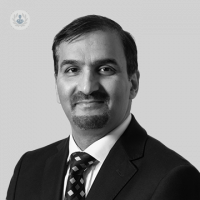6 varicose veins myths debunked by a vascular surgeon
Written in association with:Varicose veins can be unsightly, painful and in some cases dangerous. There are many myths surrounding the swollen, twisted veins, such as whether they are only an aesthetic concern and not a medical condition, or if crossing your legs or standing for prolonged periods causes the veins. We took the opportunity to ask one of our expert consultant vascular surgeons Mr S. Tawqeer Rashid to help us debunk these myths once and for all.

Myth 1: “Varicose veins are only a painless cosmetic problem (not a health one)”
This is a common misconception. Varicose veins can cause a range of problems from pain, swelling and itching to irreversible changes in the skin with around 5% of patients developing serious problems like leg ulcers and bleeding.
Myth 2: “Varicose veins are always visible”
By definition, this is essentially true as we describe varicose veins as dilated, tortuous superficial veins. However, the underlying condition of venous incompetence can be present even without visible varicose veins and can result in problems like swelling and pain.
Myth 3: “Varicose and spider veins are the same”
They can be caused by the same underlying condition namely Venous incompetence. However, they are different in that varicose veins are larger and you can feel them as bulges in the skin. Spider veins are smaller and thinner and do not bulge out of the skin.
Myth 4: “Young people don't get varicose veins, only the elderly and pregnant women”
This is not quite true but it is fair to say that women and especially pregnant women notice them more and that they are found more commonly after 50 years of age.
Myth 5: “Crossing your legs or standing a lot gives you varicose veins”
There is no evidence to suggest that crossing your legs is associated with varicose veins.
Prolonged standing has been reported to increase your chances of having treatment for varicose veins. Whether this is because you have a higher chance of developing them in the first place or they are more likely to cause symptoms like aching which means people want them treated is hard to determine.
Myth 6: “Varicose veins will probably come back after surgery”
It is true that some patients will get recurrence but amongst these patients, the majority don’t need further treatment as the symptoms are often comparatively mild. Studies suggest that with modern treatments with specialists then only 10-20% will need further treatment in the first 5 years. There is not much data for what happens over longer periods of time.
Mr Rashid is highly-experienced when it comes to treating varicose veins. Do not hesitate to book an appointment with him via his Top Doctor's profile here if you would like his expert opinion in your case.


